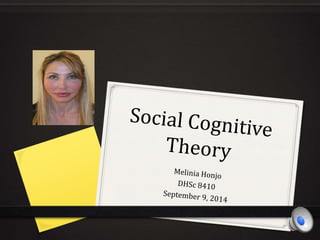
Social Cognitive Theory
- 2. Albert Bandura 0 Albert Bandura was born in Alberta, Canada in 1925 0 Doctorate studies University if Iowa. 0 Interested in behaviorist learning theories 0 Stanford University he began to examine influences of social observations and learning in more depth (Famous People Info, 2011) Image: (Famous People Info, 2011)
- 3. Social Cognitive Theory Bobo doll experiment: Adults were recorded being aggressive to bobo dolls Children were shown the video and then allow to play in a room full of toys Children were aggressive to the bobo doll just as the adults were in the video (Cherry, 2014).
- 4. Social Cognitive Theory 0 Through his research, Bandura observed that components of learning occur though observation and modeling behaviors 0 This concept led to the theoretical framework of the social cognitive learning theory (Famous People Info, 2011).
- 5. Assumptions Of Social Cognitive Theory 0 Learning occurs by observing others and modeling 0 Internal processes and cognition of observed behavior may or may not lead to a learned behavior ( learning performance distinction). 0 Behavior is goal directed- goals are set and behavior is directed to accomplishing the goal (motivation driven) 0 Behavior is eventually self-regulated 0 Punishment and reinforcement have indirect effects on the learning process (Hurst, 2014).
- 6. Reciprocal Causation Model Environment Learning Behavior Person
- 7. Environmental factors: Social models Instruction Feedback Personal factors: (cognitive) Goals Sense of efficacy Attributions Behaviors: Process of self-regulation Goal progress Motivations Learning (Zimmerman, 1989).
- 8. Types of Learning: 0 Enactive Learning- learning by doing and is reinforced by the consequences of actions/outcomes 0 Vicarious Learning- learning through observation not performance (Hurst, 2014).
- 9. The Learning Process Requires: 0 Attention 0 Retention 0 Reproduction 0 Motivation
- 10. Social Cognitive Theory: Modeling 0 Models can be real people (teachers, coaches etc.) 0 Models can also come from media: books, TV, Magazines (symbolic) 0 Models can influence behavior: positively or negatively (Schunk, 2012).
- 11. Characteristics of Models Models, both real and symbolic, have: 0 Have prestige and power 0 Models are competent 0 Perform tasks well that others would like to be able to do (Hurst, 2014).
- 12. Modeling Example John Observers Sally succeed John Models Sally’s Behavior
- 13. Modeling Example Sally did well on her test Bobby and Sue, Jenny and Jon want to do well on the next test: they study harder after seeing Sally’s score
- 14. Evaluation of Learning and Behavior 0 Perceived self-efficacy 0 Outcome expectations 0 Goal Setting 0 Self-evaluation 0 Goal Progress 0 Cognitive modeling 0 Self-instruction (Schunk, 2012).
- 15. Summary Points Learning/behavior occurs through: Models/modeling Efficacy Reinforcement Self-regulation
- 16. Strengths of Theory 0 A great deal of learning occurs from watching others 0 Strong research to support theory 0 People have considerable control over behaviors learning (motivation) (Hurst, 2014)
- 17. Weaknesses of Theory 0 The theory is loosely structured 0 Doesn’t take emotional responses into account 0 Ignores biological differences between individuals –genetic factors 0 Assumes that all behavior is a result of modeling, not genetics, illness, or other influences (Flamand, 2014).
- 18. Applications Of The Theory Think-Pare-Share: By modeling the process prior to the exercise, expectations and the goal of the exercise can be set by the instructor. By interacting with peers, students can model behavior of those they feel are self-assured and this in turn increases self-efficacy The process goes something like this: a professor gives a lecture and then asks questions about the material. Students are pared off in sets and allowed to discuss the material. Later the students voice a conclusion/answer following the collaborative discussions (Karge, Phillips, Dodson, & McCabe, 2011). Benefits: Allows for students to participate in collaborative learning and peer interaction allows for discussion. Students are more likely to model those who they feel are like them and competent in the area of studies (McLeod, 2011).
- 19. Application Of The Theory Scenario-based learning: This is the process of dividing students into small groups and then providing a situational learning environment (example CPR). The instructor demonstrates the procedure of providing CPR and then students emulate the behavior. Feedback is provided and students are able to self-correct. Students gain increased self-efficacy as they progress in the activity ( Johnson, Dana, Jordan, Draeger, Schmitt-Olabisi, Reich, 2012).
- 20. Application Of The Theory The use of discussion boards in distance learning programs: Peers have active discussions about various topics Students are engaged and encouraged by other’s posts and topics Self-efficacy increases, leading to better discussion The use of video clips, pod casts, and audio clips enhance the learning process by demonstrating concepts or tasks and allowing for modeling and better understanding (Hill, Song, West, 2009).
- 21. References 0 Cherry, K. (2014). Social Learning Theory: How People Learn By Observation. About Education Retrieved from http://psychology.about.com/od/developmentalpsycholog y/a/sociallearning.htm 0 Famous People Info. (2011). Albert Bandura: Theory Dollar and Miller. Retrieved from http://famouspeopleinfo.com/albert-bandura-theory-dollar- and-miller/ 0 Flamand, L. (2014). Limitations of Social Cognitive Theory. Ehow. Retrieved from http://www.ehow.com/about_5421206_limitations-social-cognitive- theory.html
- 22. References Hurst, M. (2014). Social-Cognitive Learning Theory: Definition and Examples. Education Portal retrieved from http://education-portal. com/academy/lesson/social-cognitive-learning-theory-definition-and- examples.html#lesson Hill, J.R, Song, L., West, R. E. (2009). Social Learning Theory and Web-Based Learning Environments: A Review of Research and Discussion of Implications. The American Journal of Distance Education, 23:1-16 Johnson, K. A., Dana, G., Jordan, N.R., Draeger, K.J., Kapuscinski, A., Schmitt- Olabisi, L.K., Reich, P.B. Using Participatory Scenarios to Simulate Social Learning for Collaborative Sustainable Development. Ecology and Society, 17(2).
- 23. References Karge, B.D., Phillips, K.M., Dodson, T.J. & McCabe, M. (2011). Effective Strategies for Engaging the Adult Learner. Journal of College Teaching & Learning, vol. 8 (12), p. 53-57. McLeod, S.A. (2011). Social Learning Theory. Retrieved from http://www.simplypsychology.org/bandura.html Schunk, D.H. (2012). Learning Theories: An Educational Perspective 6th ed, Allyn & Bacon Publishing, Boston, MA. Zimmerman, B. J. (1989). A Cognitive View of Self-Regulated Academic Learning. Journal of Educational Psychology, 81(3) 329-39